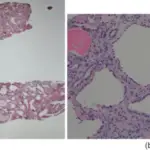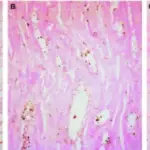Adult-onset medullary cystic disease is one of the variants of nephronophthisis-medullary cystic disease complex present in adults.
What is the Pathology of Adult-Onset Medullary Cystic Disease?
The pathology of adult-onset medullary cystic disease is:
-Etiology: The cause of adult-onset medullary cystic disease is genetic.
-Genes involved: MCKD1 and MCKD2.
-Pathogenesis: The sequence of events that lead to adult-onset medullary cystic disease results from MCKD1 and MCKD2 gene loci mutations with autosomal dominant transmission.
-Morphology: The morphology associated with adult-onset medullary cystic disease shows cysts.
-Histology: The histology associated with adult-onset medullary cystic disease shows
How does Adult-Onset Medullary Cystic Disease Present?
Patients with adult-onset medullary cystic disease typically affect both genders equally present at age range of 20 to 30 years. The symptoms, features, and clinical findings associated with adult-onset medullary cystic disease include polyuria, polydipsia, enuresis, dehydration, failure to thrive, weakness, and pallor.
How is Adult-Onset Medullary Cystic Disease Diagnosed?
Adult-onset medullary cystic disease is diagnosed by laboratory studies such as urinalysis, elevated serum BUN and creatinine concentrations, CBCs count, radiological studies such as plain radiograph, excretory urogram and CT scan.
How is Adult-Onset Medullary Cystic Disease Treated?
Adult-onset medullary cystic disease is treated through symptomatic management, renal replacement therapy- peritoneal, hemodialysis and kidney transplant.
What is the Prognosis of Adult-Onset Medullary Cystic Disease?
The prognosis of adult-onset medullary cystic disease is fair. Condition associated with ESRD.



